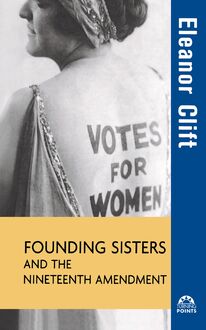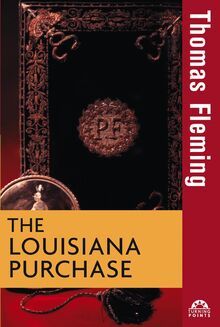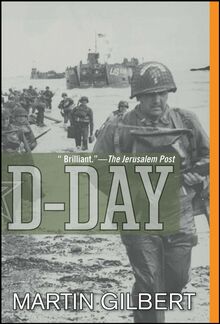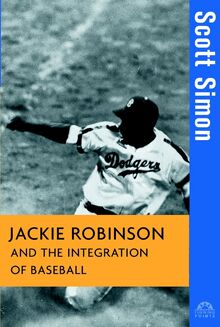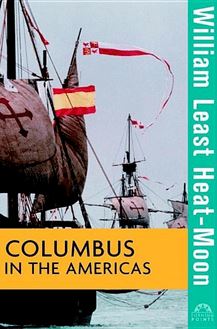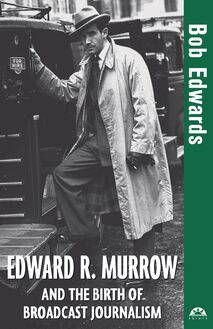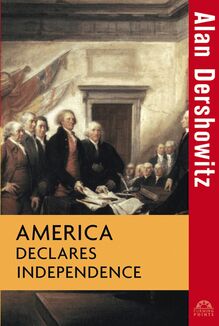Jackie Robinson and the Integration of Baseball , livre ebook
67
pages
English
Ebooks
2007
Vous pourrez modifier la taille du texte de cet ouvrage
Obtenez un accès à la bibliothèque pour le consulter en ligne En savoir plus
Découvre YouScribe en t'inscrivant gratuitement
Découvre YouScribe en t'inscrivant gratuitement
67
pages
English
Ebooks
2007
Vous pourrez modifier la taille du texte de cet ouvrage
Obtenez un accès à la bibliothèque pour le consulter en ligne En savoir plus
Publié par
Date de parution
31 juillet 2007
Nombre de lectures
0
EAN13
9780470242841
Langue
English
--Chicago Tribune
"Perhaps no one has ever told the tale [of Robinson's arrival in the major leagues] so well as [Simon] does in this extended essay."
--The Washington Post Book World
"Scott Simon tells a compelling story of risk and sacrifice, profound ugliness and profound grace, defiance and almost unimaginable courage. This is a meticulously researched, insightful, beautifully written book, one that should be read, reread, and remembered."
--Laura Hillenbrand, author of the New York Times bestseller Seabiscuit
The integration of baseball in 1947 had undeniable significance for the civil rights movement and American history. Thanks to Jackie Robinson, a barrier that had once been believed to be permanent was shattered--paving the way for scores of African Americans who wanted nothing more than to be granted the same rights as any other human being.
In this book, renowned broadcaster Scott Simon reveals how Robinson's heroism brought the country face-to-face with the question of racial equality. From his days in the army to his ascent to the major leagues, Robinson battled bigotry at every turn. Simon deftly traces the journey of the rookie who became Rookie of the Year, recalling the taunts and threats, the stolen bases and the slides to home plate, the trials and triumphs. Robinson's number, 42, has been retired by every club in major league baseball--in homage to the man who had to hang his first Brooklyn Dodgers uniform on a hook rather than in a locker.
1. Hero.
2. Steaming Home.
3. Brooklyn, 1947.
4. Barred in Boston.
5. Mr. Rickey's Little List.
6. "Oh, what a Pair, those Two!"
7. Minor Leaguer.
8. The Season.
9. Epilogue.
Acknowledgments, Notes, and Thanks.
Publié par
Date de parution
31 juillet 2007
Nombre de lectures
0
EAN13
9780470242841
Langue
English
Jackie Robinson
and the Integration of Baseball
Preeminent writers offering fresh, personal perspectives on the defining events of our time
Published Titles
William Least Heat-Moon, Columbus in the Americas Scott Simon, Jackie Robinson and the Integration of Baseball
Forthcoming Titles
Douglas Brinkley on the March on Washington William F. Buckley Jr. on the Fall of the Berlin Wall Eleanor Clift on Passing the 19th Amendment Alan Dershowitz on the Declaration of Independence Thomas Fleming on the Louisiana Purchase Sir Martin Gilbert on D-Day
Jackie Robinson
and the Integration of Baseball
S COTT S IMON
John Wiley Sons, Inc.
Copyright 2002 by Scott Simon. All rights reserved
Published by John Wiley Sons, Inc., Hoboken, New Jersey
Published simultaneously in Canada
Design and production by Navta Associates, Inc.
No part of this publication may be reproduced, stored in a retrieval system, or transmitted in any form or by any means, electronic, mechanical, photocopying, recording, scanning, or otherwise, except as permitted under Section 107 or 108 of the 1976 United States Copyright Act, without either the prior written permission of the Publisher, or authorization through payment of the appropriate per-copy fee to the Copyright Clearance Center, 222 Rosewood Drive, Danvers, MA 01923, (978) 750-8400, fax (978) 750-4470, or on the web at www.copyright.com . Requests to the Publisher for permission should be addressed to the Permissions Department, John Wiley Sons, Inc., 111 River Street, Hoboken, NJ 07030, (201) 748-6011, fax (201) 748-6008, email: permcoordinator@wiley.com.
Limit of Liability/Disclaimer of Warranty: While the publisher and author have used their best efforts in preparing this book, they make no representations or warranties with respect to the accuracy or completeness of the contents of this book and specifically disclaim any implied warranties of merchantability or fitness for a particular purpose. No warranty may be created or extended by sales representatives or written sales materials. The advice and strategies contained herein may not be suitable for your situation. You should consult with a professional where appropriate. Neither the publisher nor the author shall be liable for any loss of profit or any other commercial damages, including but not limited to special, incidental, consequential, or other damages.
For general information about our other products and services, please contact our Customer Care Department within the United States at (800) 762-2974, outside the United States at (317) 572-3993 or fax (317) 572-4002.
Wiley also publishes its books in a variety of electronic formats. Some content that appears in print may not be available in electronic books.
ISBN 978-0-471-43211-1
Printed in the United States of America
10 9 8 7 6 5 4 3 2 1
For New York
Contents
1. Hero
2. Steaming Home
3. Brooklyn, 1947
4. Barred in Boston
5. Mr. Rickey s Little List
6. Oh, What a Pair, Those Two!
7. Minor Leaguer
8. The Season
9. Epilogue
Acknowledgments, Notes, and Thanks
1
Hero
As I began this book, many Americans were beginning to be cautious about whom they called a hero. Athletes, actors, entrepreneurs, and celebrities had casually and carelessly been described as such. To do so after September 11, 2001, seemed preposterous. In the weeks following the attacks on New York and Washington, D.C., and the foiled attack that sent a plane crashing into western Pennsylvania, Americans saw the grim and affecting faces of genuine heroes-and they were caked in ash, blood, tears, toil, and sweat.
A man or woman might sink a basketball, strike a baseball, or scintillate before a camera lens. Those talents can be worthy. But real heroes risk their lives for others.
My wife and I were crossing midtown Manhattan about three weeks after the attacks and saw an assemblage of broad shoulders in blue uniforms with red patches standing outside the entrance to a church. The men and women talked softly; anonymous black cars thrummed their motors softly; pink and white flowers were piled softly into the crooks of the concrete stairs. It was the funeral for a New York firefighter. We went inside, impulsively, and then stayed, decisively. Gerard Barbara, who was a fifty-three-year-old assistant chief of the Fire Department of New York, had died risking his life for strangers. It did not seem strange-in fact, it seemed important-to take a seat amid some of the men and women who had loved him. They wore blue uniforms, thick-soled black shoes, and red eyes. Mayor Giuliani got up to speak, a gravelly voiced man in a gray suit, who also had red eyes. It was Mayor Giuliani s fourth funeral service of the day.
Your father, he said to Gerard Barbara s son and daughter, used his great gift of courage to serve others. The name he gave you, he continued in the blunt tone of a commandment, is now a permanent part of the history of this city. And now, I would like everyone here to stand and express their appreciation for your father. We stood, cried, and clapped our hands until our palms burned like our eyes, then we applauded some more. A line of blue shoulders with red patches filed softly out of the church and back onto Fifth Avenue, where, for at least a time, FDNY had replaced DKNY as a signature of distinction.
The following weekend, we watched Cal Ripken Jr. play his last game of major league baseball-his 3,001st. Over a quarter of a century as a professional athlete, Cal Ripken had become such an insignia of sturdiness and class that the umpires stood in a line to shake his hand. His opponents removed their fielding gloves to applaud him. The signs blooming amid the green seats of Baltimore s Oriole Park at Camden Yards said WE LOVE YOU CAL; THANKS, CAL; and CAL: WE LL NEVER FORGET YOU . But the word hero seemed conspicuously, deliberately absent. Events had revised our national vocabulary. At least for the moment-it would be nice to think even for longer-it would be hard for Americans to look out at a mere playing field and see the kind of heroism we had been reminded to revere in men and women in blue uniforms with red patches.
But even by this wiser standard, Jackie Robinson was a hero. The baseball diamond is not simply a playing field in his story. It was the ground on which he was most open and vulnerable to taunts, threats, and sharpened spikes.
The first African American major league ballplayer of the twentieth century routinely took his rolling, pigeon-toed stride out into the infield or batter s box on days and nights when local police had culled the stadium s mail to show him an assortment of explicit and persuasive death threats. It is tempting today, when Jackie Robinson is enshrined in halls of fame, social studies curricula, classroom calendars, songs, and statues, to suppose those threats were empty. But in the late 1940s, beatings, bombings, lynchings, and shootings scarred the landscape of the United States. They could be just as public as-well, as baseball games.
Jackie Robinson gave his life for something great; heroes do. He chose to bear the daily, bloody trial of standing up to beanballs and cleats launched into his shins, chest, and chin, and the race-baiting taunts raining down from the stands, along with trash, tomatoes, rocks, watermelon slices, and Sambo dolls. And then he performed with eloquent achievement and superlative poise. Robinson allowed that hatred to strike him as it would a lightning rod, chanelling it down into the rugged earth of himself. All that America saw for many years on the baseball field was that iron as upright as a steeple, never bending. But inside, the strain slowed his body, whitened his hair, thickened his circulation, aggravated his diabetes, and rendered him slow and blind. He was dead by the age of fifty-three-a martyr (a word as deliberately applied as hero ) to trying to make America live up to its creed.
If Jackie Robinson had not been selected to play the role he performed so well, no doubt other superb African American athletes would have soon stepped onto the stage. The skills of Larry Doby, Roy Campanella, Sam Jethroe, Ray Dandridge, Willie Mays, Monte Irvin, Ernie Banks, and an aging Satchel Paige were too great not to tempt major league clubs who were searching for new sources of talent. World War II had moved many Americans to examine their nation s own self-image as a bulwark of freedom. Editorial writers and civic leaders were already clamoring for America to integrate the armed forces, which had just won the world s liberty, the schools, in which children learned about justice, and sports, which purported to epitomize American values. How could a young black man who might be called up to risk his life backing up Pee Wee Reese in Guam, or Yogi Berra in Normandy, not be allowed to earn a living alongside them on the same playing field?
America s modern civil rights revolution was already stirring by the time Jackie Robinson arrived in major league baseball. With Vernon Johns, Thurgood Marshall, A. Philip Randolph, and many more, it had already produced heroes. But Robinson s courage and accomplishment put a familiar face on the kind of bravery that it took for blacks to stand up for their rights. His heroism was no greater than that of millions of others-some achievements simply cannot fit into box scores. But Robinson s renown gave his heroism reach. It is possible to see, in Robinson s slow, purposeful walk into the face of taunts and threats, some of the same unbowed courage that Americans would later admire in the civil rights marchers who faced down stinging water sprays, sharp rocks, and snapping police dogs. When Robinson joined Dr. Martin Luther King s nonviolent campaign in Birmingham in 1963, marchers called out, Show us, Jackie!
Jackie Robinson is so highly esteemed for his Gandhian restraint against the onslaughts of bigotry that it is easy to mistake him for a social activist. He certai
